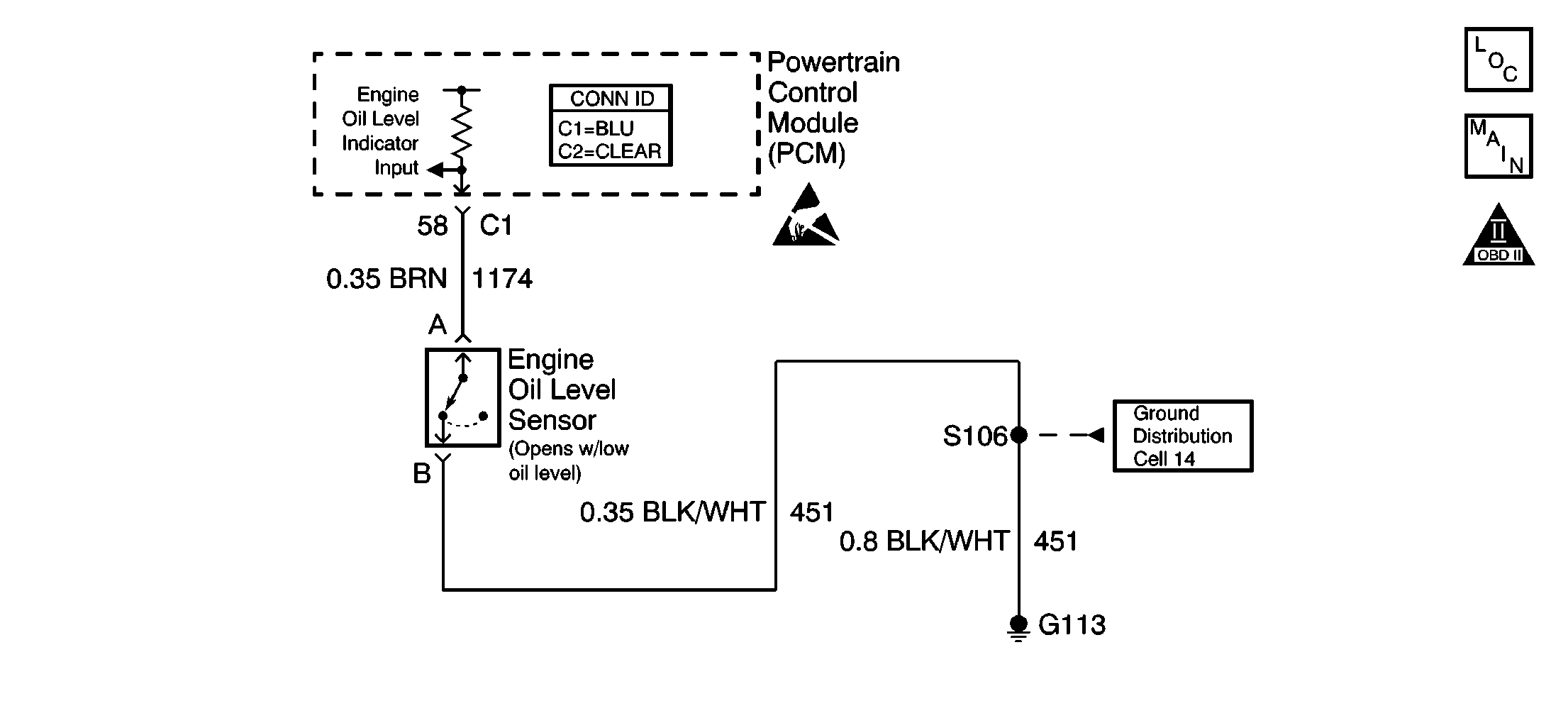
Circuit Description
The engine oil level switch is a simple float switch that is grounded when the engine oil level is OK. The powertrain control module (PCM) tests the engine oil level switch circuit at startup. Before testing the state of the engine oil level switch, the PCM performs a test routine based on time and the engine coolant temperature to ensure that the engine oil has drained back into the sump. To test for a low oil level at start-up, one of the following conditions must be present:
| • | The engine coolant temperature must be more than 15°C (59°F). |
| • | The engine coolant temperature at key ON must be at least 12°C (22°F) cooler than the engine coolant temperature at the last key OFF. |
The low oil level lamp will be illuminated for about 1 minute when the PCM tests for a low oil level and the engine oil level switch indicates that a low oil level condition exists. When the ignition is first turned ON, the instrument panel cluster (IPC) commands the low oil level lamp ON for a brief period of time in order to test the bulb.
Diagnostic Aids
The low oil level message may not appear if other messages are being commanded, such as the rear deck lid, driver door ajar, or passenger doors ajar. Before diagnosing a low oil level condition ensure that all the doors and the compartment lids are completely closed. For diagnosis of the instrument panel cluster, perform the Diagnostic System Check - Instrument Cluster in Instrument Panel, Gauges, and Console.
Inspect for the following conditions:
Many situations may lead to an intermittent condition. Perform each inspection or test as directed.
Important: : Remove any debris from the connector surfaces before servicing a component. Inspect the connector gaskets when diagnosing or replacing a component. Ensure that the gaskets are installed correctly. The gaskets prevent contaminate intrusion.
| • | Loose terminal connection |
| - | Use a corresponding mating terminal to test for proper tension. Refer to Testing for Intermittent Conditions and Poor Connections , and to Connector Repairs in Wiring Systems for diagnosis and repair. |
| - | Inspect the harness connectors for backed out terminals, improper mating, broken locks, improperly formed or damaged terminals, and faulty terminal to wire connection. Refer to Testing for Intermittent Conditions and Poor Connections , and to Connector Repairs in Wiring Systems for diagnosis and repair. |
| • | Damaged harness--Inspect the wiring harness for damage. If the harness inspection does not reveal a problem, observe the display on the scan tool while moving connectors and wiring harnesses related to the sensor. A change in the scan tool display may indicate the location of the fault. Refer to Wiring Repairs in Wiring Systems for diagnosis and repair. |
| • | Inspect the powertrain control module (PCM) and the engine grounds for clean and secure connections. Refer to Wiring Repairs in Wiring Systems for diagnosis and repair. |
If the condition is determined to be intermittent, reviewing the Snapshot or Freeze Frame/Failure Records may be useful in determining when the DTC or condition was identified.
Test Description
The numbers below refer to the step numbers on the diagnostic table.
-
This vehicle is equipped with a PCM which utilizes an electrically erasable programmable read-only memory (EEPROM). If the PCM is replaced, the new PCM must be programmed.
-
In order for the PCM to test the engine oil level, the start-up engine coolant temperature must be at least 12°C (22°F) less than the engine coolant temperature was the last time the ignition was turned OFF. Allowing the engine to warm and then cool ensures that the PCM tests the engine oil level switch and that the information displayed on the scan tool is current.
Step | Action | Values | Yes | No |
|---|---|---|---|---|
1 |
Important: : Ensure that engine oil level is not low before continuing this diagnosis. Refer to Fluid and Lubricant Recommendations in Maintenance and Lubrication. Did you perform the Powertrain On-Board Diagnostic (OBD) System Check? | -- | ||
2 | Observe the oil level display on the scan tool. Does the oil level display as OK? | -- | Go to Diagnostic Aids | |
3 |
Does the test lamp illuminate? | -- | ||
4 |
Is the voltage near the specified value? | B+ | ||
5 | Connect the DMM between the oil level switch signal circuit and chassis ground. Is the voltage near the specified value? | B+ | ||
6 | Test the oil level switch signal circuit for an open. Refer to Wiring Repairs in Wiring Systems. Did you find and correct the condition? | -- | Go to Diagnostic Aids | |
7 | Test for poor terminal connections at the PCM. Refer to Testing for Intermittent Conditions and Poor Connections in Wiring Systems. Did you find and correct the condition? | -- | ||
8 | Test for poor terminal connections at the oil level switch. Refer to Testing for Intermittent Conditions and Poor Connections in Wiring Systems. Did you find and correct the condition? | -- | ||
9 | Repair the open in the ground circuit of the oil level switch . Refer to Wiring Repairs in Wiring Systems. Did you complete the repair? | -- | -- | |
10 | Replace the oil level switch. Did you complete the repair? | -- | -- | |
|
Important: : The replacement PCM must be programmed. Replace the PCM. Refer to Powertrain Control Module Replacement/Programming . Did you complete the replacement? | -- | -- | ||
Does the oil level display as OK? | -- | System OK |
